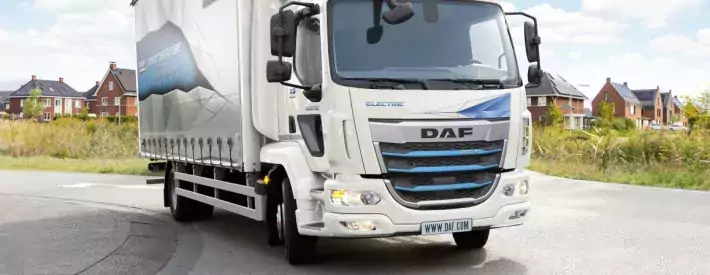Hi-tech tools of the truck trade

Among the many challenges faced by the automotive industry, recruiting technicians is high on the list. The truck industry might not have faced the same level of shutdown as light vehicle garages during the pandemic, but manufacturers are still playing catch-up when it comes to attracting new recruits to their businesses.
With the commercial vehicle sector facing the same transition ban on ICE power – albeit with a longer deadline than for cars and vans – that shortage comes at a time when new skills need to be taught for a completely new type of vehicle.
As the number one truck manufacturer in the UK market, DAF faces a major undertaking when it comes to embracing the transition to electric and ensuring its technician community is fully prepared. The company’s network comprises 137 dealerships and more than 1,500 technicians with varying levels of competency, while its apprentice programme consists of a three-year course, with around 400 apprentices progressing through the system at any given time.
“All of our training has been geared around the diesel market for years, so we’ve taught diagnostics for all the main driveline components,” explains John McMenamin, dealer development director at DAF. “The electric vehicle has been fully embraced by the car market but the technology needed to move a 40-tonne truck is very different, not to mention application and delivery. We’re in the early stages in terms of training our people, so we’re selecting a specific group from our existing technician base and training them up on electric drivelines. They have reached master diagnostic technician level, so they already have a good understanding of the DAF product, as well as electronics, CANbus and the other technologies on our diesel vehicles.”
McMenamin says DAF is currently trying to introduce the concept of electric vehicle drivelines and how they differ from ICE to its technicians. “There are fundamental differences, but the vehicle still has a cab and a front and rear axle,” he says. “It’s only the bit in the middle that has really changed. Not every DAF dealership is going to be EV-compliant immediately because we’ve got our own set of newly published dealer standards that are applicable to our bespoke EV truck centres. There the tooling, environment and knowledge base will be very different to what’s seen in a standard dealership.”
Safety first
The most important element for DAF technicians when it comes to training for EV is safety. “If one of these trucks breaks down on the side of the road or comes into a workshop, the technicians need to be clear on how they first approach the vehicle,” says McMenamin. “Health and safety is vital because you’re working in a high-voltage environment, so what we have to do is equip the technician with the knowledge of how to power down a vehicle safely as well as power it up. They also need to know where to plug it in for diagnostics and how to ensure the vehicle is in a safe situation for anyone to approach it, whether that’s in the workshop or at the roadside.”
Right now, McMenamin says around 50 DAF technicians have received the necessary training to work on electric trucks. A relatively small figure, but the EV rollout within the manufacturer is in its infancy. “What we have is a situation where if we have 20 new EVs going into a particular operator, we will circle the wagons and train up all the guys at the nearest dealership to where the vehicles will be based,” he reveals. “The first electric vehicles are due in the UK towards the end of this year, so we’re trying to schedule the training just before those vehicles are delivered then continue that as volumes ramp up. The appetite for EVs within our network is strong.”
The whole industry is facing a new future. It may be taking hold in the heavy vehicle sector slower than other areas, but it’s coming nonetheless. Businesses need to be prepared and technician training is critical to that process.
This is an edited extract from IMI's new MotorPro magazine, received free as part of IMI membership




